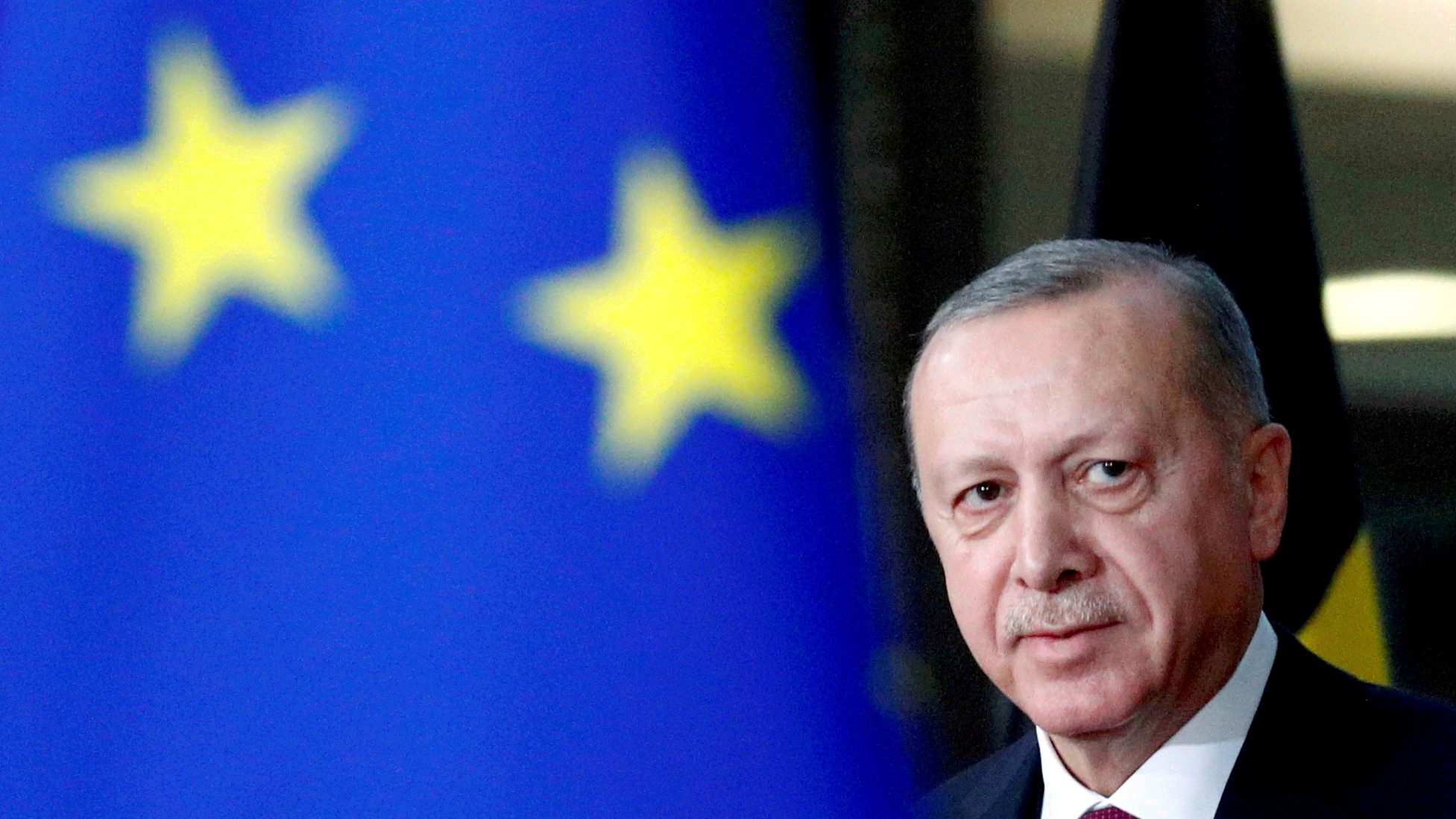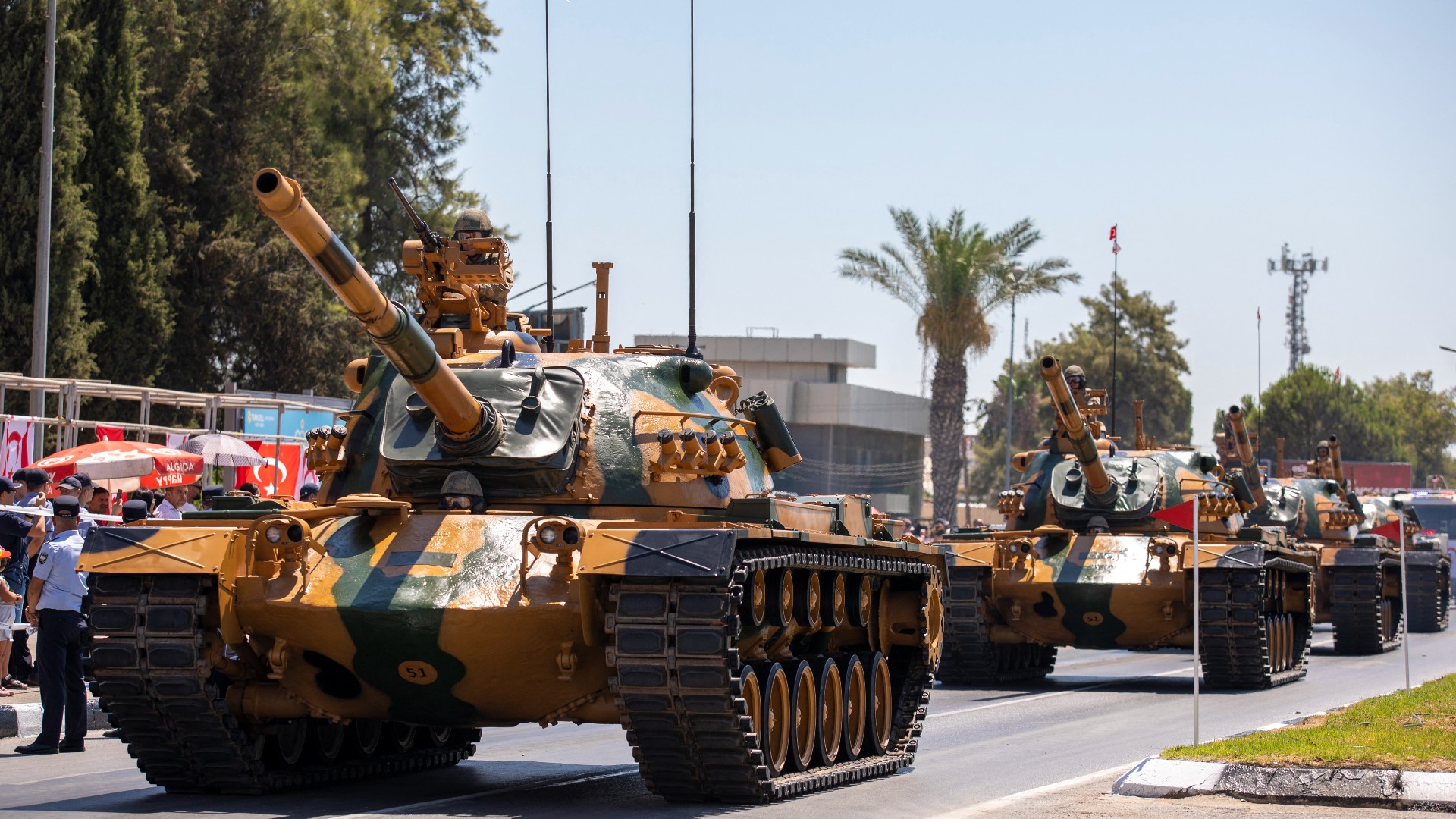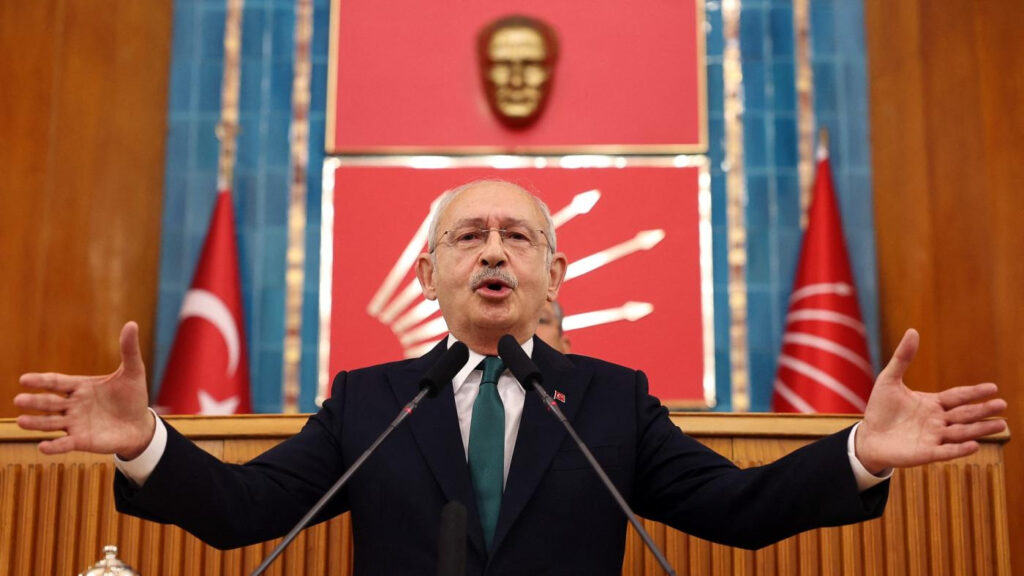For the first time in 22 years, Turkish President Recep Tayyip Erdogan, the bete noire of the West who is often labelled abroad as an autocrat, could lose power.
Opinion polls consistently predict a victory for the opposition’s joint presidential candidate Kemal Kilicdaroglu in the second round of elections, scheduled for May, if no one gets over 50 percent the first time round.
This prospect puts the foreign policy of the opposition in the international spotlight.
Will Turkey pull back from Libya or Syria? Will it get closer to the US and Israel? Will Turkey stop being the awkward man of Nato?
The United States has made no secret of its dislike for Erdogan. US President Joe Biden said he would like an opposition government and Kilicdaroglu made a point of visiting the country early in his campaign.
Stay informed with MEE’s newsletters
Sign up to get the latest alerts, insights and analysis, starting with Turkey Unpacked
This has led to speculation that Turkish foreign policy, which has helped shaped much of the world in recent years, could take a sharp – perhaps isolationist – turn.
On one hand, Kilicdaroglu has delivered captivating promises that made headlines in Turkey, such as promising visa-free travel to the European Union within three months of taking office or threatening Greece with armed intervention.
But people close to him are keen to bring more nuance to these statements, and speak of possible foreign policy priorities in broader terms, asking for caution when it comes to predicting the future.
Unal Cevikoz, a retired ambassador and Kilicdaroglu’s chief advisor on foreign affairs, said a Kilicdaroglu-led government would be determined to normalise its relations with the international community, the EU, and Nato.
He told Middle East Eye that Kilicdaroglu’s foreign policy would be based on “non-intervention of domestic affairs of neighbours, impartial foreign policy and adherence to international norms”.
These pillars are not particularly novel. A raft of governments in the 1980s and 1990s that preceded Erdogan touted much the same ideals.
‘We will prioritise dialogue and a non-interventionist approach. We will be an honest broker in places like Libya by talking to all sides’
– Unal Cevikoz, Kilicdaroglu’s chief advisor on foreign affairs
It is no coincidence that the opposition Nation Alliance, led by Kilicdaroglu’s Republican People’s Party (CHP), declared Turkey will re-adopt Mustafa Kemal Ataturk’s slogan “peace at home, peace in the world” as its foreign policy cornerstone.
Cevikoz said that under Erdogan Turkey has maintained an interventionist and ideological foreign policy that relies on hard power in countries like Libya, where Turkish forces backed an UN-recognised government in a 2019-2020 civil war.
That has to change, he insists. “Diplomacy and dialogue have been left behind,” he told MEE. “We will prioritise dialogue and a non-interventionist approach. We will be an honest broker in places like Libya by talking to all sides.”
Cevikoz said Ankara has been running its foreign affairs based on opaque and personal relationships among leaders, a practice that would be corrected with institution building.
He added that every dispute must be discussed between countries beginning on lower-level contacts, moving further up levels of seniority until the leadership itself if there is no resolution.
EU policy
Opposition officials in Ankara reiterate that Kilicdaroglu has not yet made his mind up on any issue other than the European Union.
Cevikoz, for example, said a Kilicdaroglu government would uphold European Court of Human Rights (ECHR) judgements, releasing prominent Kurdish politician Selahattin Demirtas and Turkish philanthropist Osman Kavala from prison.
Two European ambassadors, speaking anonymously, told MEE that Kilicdaroglu promised EU diplomats at an event in Ankara earlier this month that his government would meet all the benchmarks and reforms demanded by the bloc, even if it does not accept Turkey as a member.
On the other hand, a senior Turkish opposition official, who spoke anonymously in order to talk freely, acknowledged that Kilicdaroglu’s promise to allow Turkish citizens to freely visit Schengen area countries is very optimistic.
“These are electoral promises that would be translated into policies. But of course, it might very well take more than three months to achieve a visa-liberalisation deal,” the official said. “But we are sure that we can deliver it in time.”

A second senior Turkish opposition official, who also spoke anonymously, said that under Kilicdaroglu Turkey would no longer pursue “foreign policy adventures”.
“Our fundamental priority would be core national security issues, such as the terror threat emanating from Syria and Iraq,” the official said.
“Why are we in Somalia? There is no reason. Why do we have thousands of soldiers in Qatar? Why are we in Libya, where we have taken a side in a civil war? We will review all of them.”
Turkey set up its biggest overseas military base in the Somali capital Mogadishu in 2017, which is capable of training 1,500 soldiers at a time. Ankara’s move at the time was interpreted as a step to counterbalance countries like the UAE in the Horn of Africa.
The same year, Turkey deployed soldiers to Qatar when Doha was being increasingly isolated by its Gulf neighbours. There were reports the deployment potentially blocked a palace coup that could have overthrown the Al Thani family from power.
Syrian refugees
Then, there’s Syria. The second opposition official said Turkey’s Syria policy would largely depend on dialogue with Syrian President Bashar al-Assad, who for a decade has been a pariah but is increasingly welcomed among Middle Eastern countries.
The opposition has long called for resuming ties with Assad with a view of returning Syrian refugees, policies that have become increasingly popular and mimicked somewhat by Erodgan, whose government has begun outreach to Damascus.
Yet Turkish troops remain in northern Syria, backing rebel groups and occasionally facing off against Syrian Kurdish factions.
“Turkey has taken a side in the Syrian civil war, and it will be corrected,” the official said. “We won’t immediately withdraw from Syria, I cannot give a timeline, but we will discuss our conditions and see what happens.”
Turkey elections: Would Kilicdaroglu surrender Ankara’s independence?
David Hearst
The official said Turkey’s current administrative and aid work in northern Syria will continue, but the military presence would depend on a final deal that ensures border security against terrorist threats.
That deal, the official said, would be based on the 1998 Adana agreement where Syria promised Turkey it wouldn’t harbour terrorist groups and would allow Ankara to military intervene 5km beyond the border to protect itself.
“The Adana agreement … will have a major importance to resolve the issue,” the official said.
The official added that it will take a long time to gain the trust of Damascus and disentangle the situation in the north, particularly in Idlib province, where armed groups such as Hay’at Tahrir al-Sham, al-Qaeda’s former Syrian branch, exist.
“We will have to re-engage with local people in Idlib, and win them back to society,” the official said. “But we cannot do it alone.”
Kilicdaroglu, however, has set the clock ticking. In March, he promised to send Syrian refugees back to their homeland within two years.
The official said the return of 3.7 million Syrian refugees from Turkey is an important project that would require tremendous amounts of effort and probably a timeframe longer than two years.
“No doubt it will be on a voluntary basis,” the official said. “It will require incentivisation, job opportunities, and rehabilitation. And we will definitely want to share the burden with the EU, US, and UN.”
Russia and the US
Western capitals are also curious about how Ankara will deal with Russia moving forward.
Since the Russian invasion of Ukraine, Erdogan has managed to maintain a balance between Moscow and Kyiv – even arming the latter without backlash from the former.
Both opposition officials agree that Ankara should continue this balanced approach by pursuing a position as a mediator. They also say that Ankara shouldn’t join the western sanctions on Russia, which Erdogan has also avoided.
When it comes to Washington, the opposition has taken a harder line than many might expect.
Kilicdaroglu last year said that the US had filled Greece with military bases and his party was ready to back the Erdogan government if it wanted to close all American military facilities in Turkey.
“We are against foreign soldiers on our land as much as we are against neoliberalism. We are ready to do whatever is necessary,” he said.
Yet last month, Kilicdaroglu met US Ambassador Jeff Flake in Ankara, drawing anger from Erdogan, who is suspicious of Washington due to President Joe Biden’s statements during the 2020 US election campaign where he said he would back the opposition and the Turkish president had “to pay a price”.
Opposition officials say Turkey would maintain its relations with the US on the basis of equal partnership, but they cannot address questions like how would they resolve tensions over the US backing of Kurdish armed groups in Syria.
They say they will strive to re-enter the fifth-generation F-35 fighter jet programme. The US kicked Ankara out of the programme in 2019 after Turkey purchased Russian-made S-400 missile defence systems. A return to the F-35 programme might mean that Ankara wouldn’t be able to activate the S-400s.
Greece, Cyprus, and Israel
As for neighbours Greece and Cyprus, both officials said Turkey would restart “results-oriented” dialogue with Athens.
“If we cannot reach a resolution with them, we are ready to take everything to court, including maritime delimitation, territorial waters, and airspace,” the first opposition official said.
Both officials added that the next government would address issues with Cyprus first by unifying the Turkish-controlled north, which has a local government that supports independence and an opposition that wants a federal solution. Then it would begin continuous UN-brokered talks with the Republic of Cyprus in the south, as happened in the failed 2017 dialogue in Crans Montana.

What about Israel, Egypt, and the Gulf?
Kilicdaroglu last year said that he would hold Israel and Saudi Arabia accountable for steps they have taken against Turkey in recent years, promising to backtrack from Ankara’s recent policies that have sought detente with its regional neighbours.
“There is a price for martyring our citizens in international waters,” he said, referring to the 2010 Mavi Marmara flotilla incident, where nine Turkish activists were killed by Israeli forces in a civilian aid ship headed for the Gaza Strip.
“My message to Israel is that this issue is not closed to us.”
The second senior opposition politician said Ankara wouldn’t run a hardline foreign policy in the Middle East and would try to talk to both Israel and Palestine.
“Our sense about Mavi Marmara is that Israel’s monetary payments didn’t reach the families of victims,” the official said of the compensation promised by the Israelis. “We would look into this issue, but it wouldn’t disrupt our relations with Israel.”
Israel made the payments but the families of Mavi Marmara victims refused to take them.
Gulf states
As for the Gulf Arab states, many of which spent years opposed to Ankara until a recent detente, the second official said Turkey would review its relations but maintain ties. “We would like to have equal relations with everyone in the region,” the official said.
Both officials said that Ankara has cut off-the-record deals with countries such as Saudi Arabia, the UAE, and Qatar in recent years.
“We don’t know exactly what promises were made, and what was taken in return,” the first official added. “We will have to see all of them to make our minds up on what will come next.”
The second official said that a Kilicdaroglu government, for example, would like to deepen its defence industry ties with Israel and Europe, as well as the UK.
The officials caution that everything is very fluid and no final decision has been made on any issue other than the points agreed among the six opposition parties that make up the Kilicdaroglu-led Nation Alliance.
“But we are ready to negotiate everything to normalise our relations with neighbours like Israel and Egypt,” the second official added. “We might have to discuss the presence of Hamas and Muslim Brotherhood in Turkey with them.”
Source: MEE


